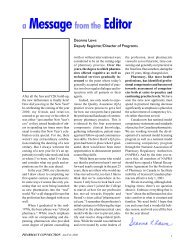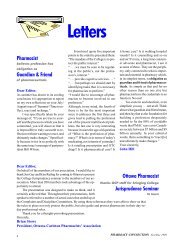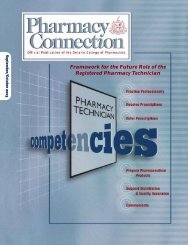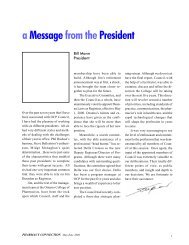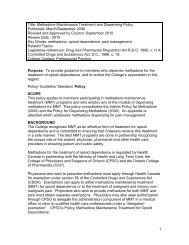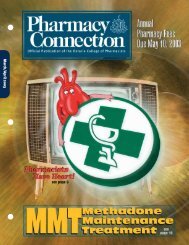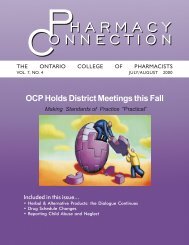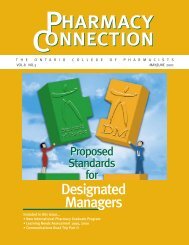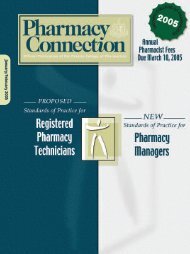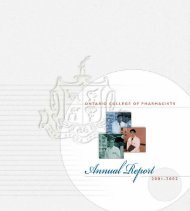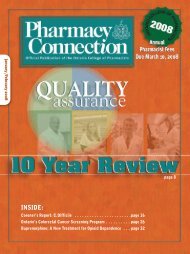July ⢠August 2003 - Ontario College of Pharmacists
July ⢠August 2003 - Ontario College of Pharmacists
July ⢠August 2003 - Ontario College of Pharmacists
Create successful ePaper yourself
Turn your PDF publications into a flip-book with our unique Google optimized e-Paper software.
COMPLAINTS<br />
Reasons<br />
The Complaints Committee reviewed<br />
the transaction records and determined<br />
that the member had violated<br />
his pharmacy’s standing protocol with<br />
the insurer by repeatedly submitting<br />
the patient’s prescription (despite the<br />
system’s failure to accept the transaction).<br />
The Committee appreciated the<br />
member’s willingness and intent to<br />
promptly fill the patient’s prescriptions;<br />
there were; however, there were<br />
more appropriate courses <strong>of</strong> action<br />
available to the pharmacist. The pharmacist<br />
could have:<br />
• Dispensed the medication as a<br />
cash purchase to the patient,<br />
knowing that the patient could<br />
be reimbursed once he proved<br />
that he was insured; or<br />
• Paused to phone the insurer to<br />
verify whether there was indeed<br />
a “glitch” in the system records<br />
that failed to note that the<br />
patient was covered<br />
The Committee did not consider<br />
this to be a situation where the pharmacist<br />
was exercising his<br />
“pr<strong>of</strong>essional judgment” to override<br />
the system because the member has<br />
no discretionary permission to alter<br />
third party records or billings.<br />
It was highly inappropriate for the<br />
member to alter a record to force a<br />
transaction that would override an<br />
adjudication system.<br />
And, while the member’s motive<br />
may have been to accommodate his<br />
patient, his actions led to intentional<br />
and repeated re-submissions despite<br />
the computer system indicating<br />
“claimant not covered”.<br />
Decision<br />
Although the Committee concluded<br />
that the member had acted inappropriately,<br />
it struggled to determine a<br />
suitable disposition. Indeed, is<br />
referral to the Discipline Committee<br />
the only appropriate remediation for<br />
the member’s behaviour?<br />
After much discussion, the<br />
Committee decided that referral to<br />
the Discipline Committee would be<br />
inappropriate and that the member’s<br />
breach <strong>of</strong> the Standards <strong>of</strong> Practice<br />
would be appropriately addressed<br />
with the issuance <strong>of</strong> a written<br />
caution, which read:<br />
“As a practising pharmacist, you<br />
must maintain the standards <strong>of</strong><br />
your pr<strong>of</strong>ession and remain in<br />
compliance with the relevant<br />
legislation. While the Committee<br />
appreciates that you may have<br />
been attempting to accommodate<br />
your patient, you are cautioned<br />
that you are expected to fulfill<br />
your obligations to your patient<br />
without violating protocol and the<br />
standards <strong>of</strong> your pr<strong>of</strong>ession, and<br />
are reminded here particularly <strong>of</strong><br />
Standard 6 which reads:<br />
‘The pharmacist applies knowledge,<br />
principles and skills <strong>of</strong><br />
management as they pertain to the<br />
site <strong>of</strong> pharmacy practice, with the<br />
goal <strong>of</strong> optimizing patient care and<br />
inter-pr<strong>of</strong>essional relations.’ ”<br />
The Committee was <strong>of</strong> the<br />
opinion that another such incident<br />
was unlikely to occur in this<br />
member’s practice given: this was a<br />
single incident involving a minor<br />
amount <strong>of</strong> money for a patient who<br />
became insured within 4 days <strong>of</strong> the<br />
transaction; the member had no<br />
intent to mislead, and he provided a<br />
forthright response to the<br />
Committee.<br />
Nonetheless, although this<br />
complaint did not reveal any evidence<br />
<strong>of</strong> fraud by the member or the pharmacy,<br />
the <strong>College</strong>’s investigation did<br />
confirm that the third-party insurer<br />
should not have been billed and that<br />
the member had violated his pharmacy’s<br />
agreement with the insurer.<br />
The Committee therefore determined<br />
that a written caution<br />
adequately addresses the public<br />
interest raised in this complaint. The<br />
caution will remain on the member’s<br />
record in the non-public portion <strong>of</strong><br />
the Register.<br />
WHAT IS A WRITTEN<br />
CAUTION?<br />
A written caution is <strong>of</strong>ten issued by<br />
the Complaints Committee as an<br />
appropriate remedial measure for<br />
serious matters where a referral to<br />
the Discipline Committee would not<br />
be appropriate. Although the member<br />
identified in a complaint is not<br />
required to appear before the<br />
Complaints Committee for his/her<br />
“caution”, the caution is included<br />
in the Committee’s written decision,<br />
thereby sent to the complainant as<br />
well as the member. It is also permanently<br />
placed on the member’s<br />
non-public portion <strong>of</strong> the Register.<br />
Although it is not considered punitive,<br />
the caution may be considered<br />
should the member appear before<br />
the Committee for a new complaint.<br />
Pharmacy Connection <strong>July</strong> • <strong>August</strong> <strong>2003</strong> 29



